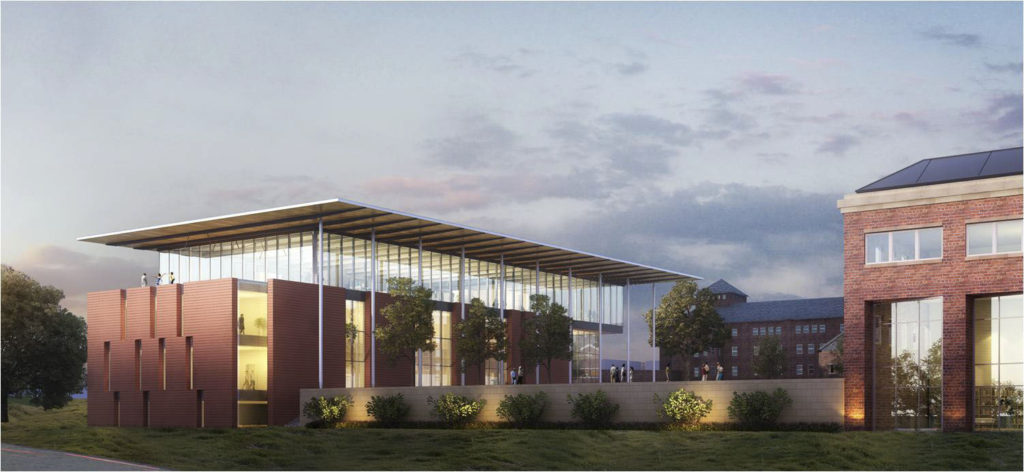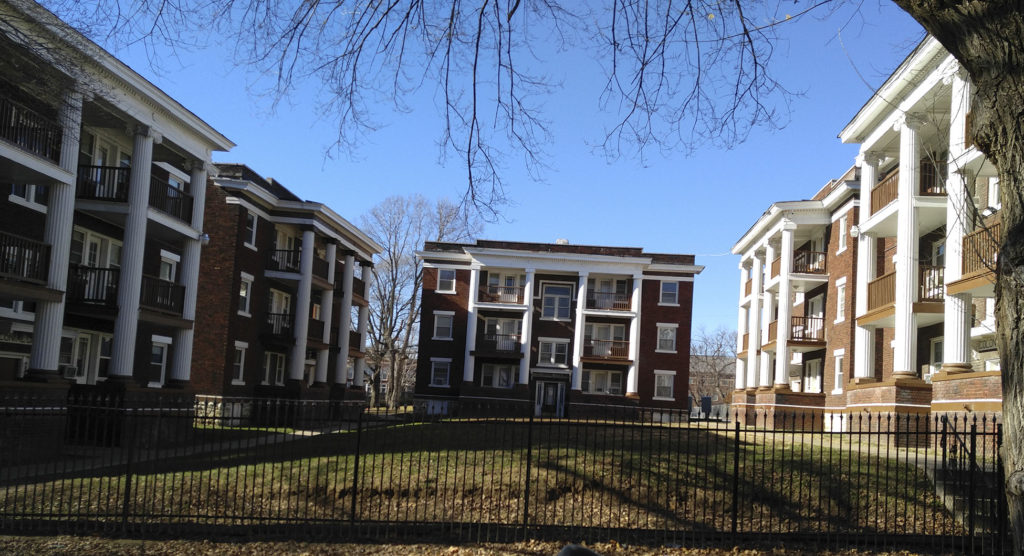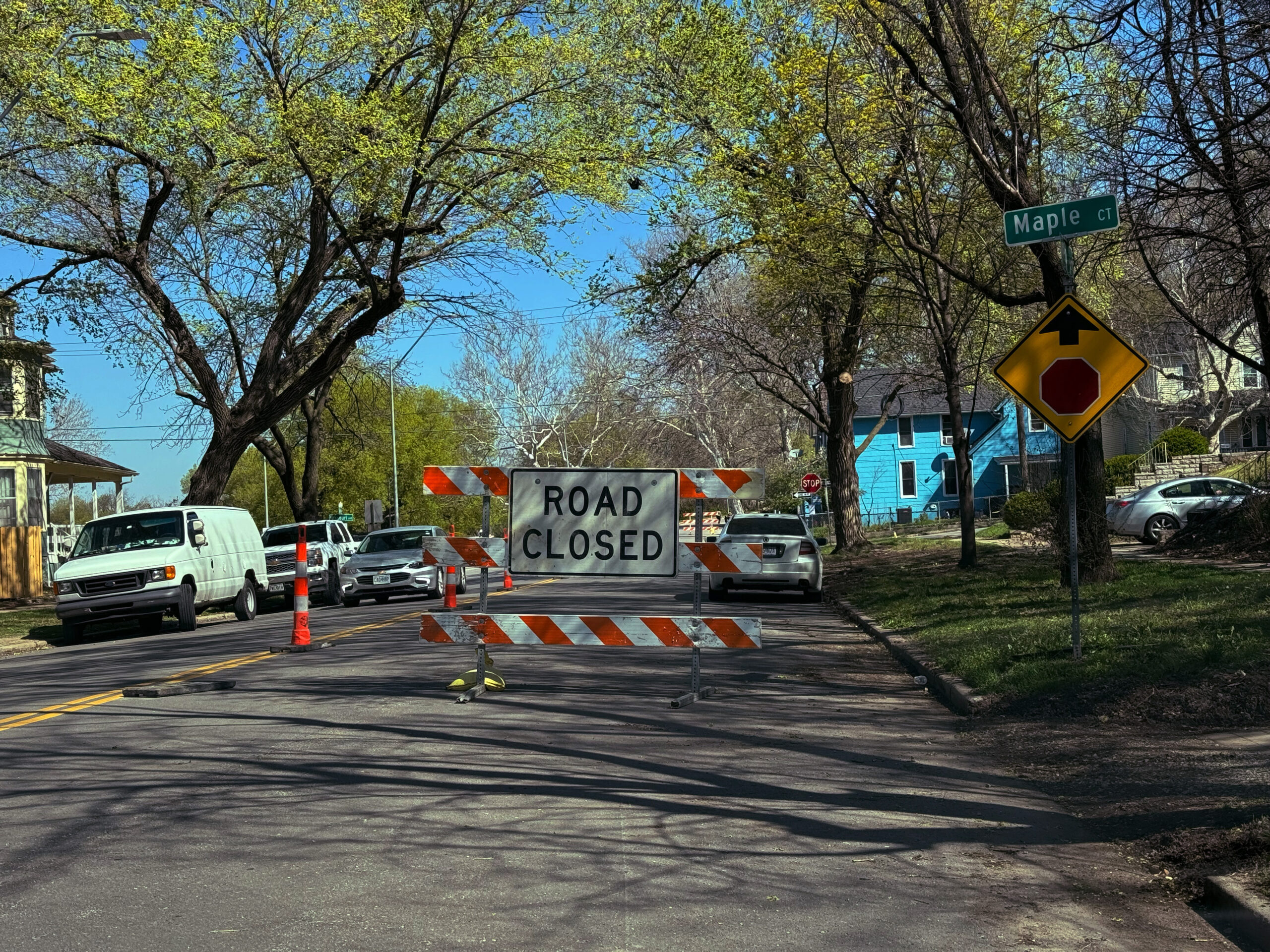
By Paul Thompson
Northeast News
February 17, 2017
KANSAS CITY, Missouri – A proposal that would pave the way for the expansion of a 100-year-old University in the Historic Northeast – while also angering some historic preservationists by demolishing 100-year-old apartment buildings now owned by the school – will become a reality if it’s approved by the full City Council on Thursday, February 23.
Kansas City University of Medicine and Biosciences (KCU) passed another step in its bid to establish a Master Planned Development (MPD) district on its campus on Wednesday, February 15, as the KCMO City Council’s Planning, Zoning and Economic Development (PZED) committee passed an MPD ordinance on to the full Council.
Before that decision, though, the PZED committee went through a lengthy closed session and several hours of testimony. Even with a unanimous vote to pass the ordinance on, some major questions remained unanswered. For one, a fundamental disagreement remains between KCU and City legal staff over how the Master Planned Development district should be classified. KCU legal representative Jim Bowers, Jr. stated his belief that the MPD should be classified as a special purpose district that operates like an overlay; City legal staff contends that the development code defines MPD’s as base zoning districts.
At the conclusion of the meeting there was still no agreement on this issue, though City staff remained resolute in their position. In defense of their stance, the City’s legal staff cited section 88-250-01 of the development code, which says that special purpose districts like MPD’s are to be classified as base districts.
Section 88-250-01 reads as follows: “Like overlay zoning districts, special purpose zoning districts are tools for dealing with special situations or accomplishing special planning and zoning goals. Unlike overlay districts, special purpose districts are base zoning classifications; they do not over-lay other base zoning districts.”
“It’s very important that it’s understood that those special zoning districts are classified as base zoning districts,” said KCMO Director of City Planning and Development Jeffrey Williams, arguing that upsetting that arrangement would hurt the development code as a whole.
As a special purpose district operating as an overlay, the MPD would supersede all other area plans and zoning overlays. As a base district, the MPD would still be subject to those other zoning requirements, including those contained within the Pendleton Heights Historic District. 3rd District Councilman Quinton Lucas acknowledged that the issue has yet to be solved, telling the Northeast News after the PZED meeting that he expects the zoning questions to drag out beyond the expected full City Council vote on Feb. 23.
“Frankly, my view is that we didn’t resolve that yesterday in the Council,” said Lucas on Thursday, Feb. 16. “I leave it to KCU to argue on their own behalf.”
As presented on Feb. 15, the MPD ordinance included only 16 of the 18 conditions previously submitted by city staff ahead of the January 17 City Plan Commission hearing. During that three-hour hearing, the Plan Commission unanimously agreed to send the MPD proposal on to the PZED committee. The body recommended that all staff conditions be included in the ordinance.
Three of the conditions were omitted from the ordinance that appeared before PZED, however, as KCU has maintained their previous objections. The conditions in question include: Condition #9, related to the Pendleton Heights Historic District, which states that KCU should either abide by the historic guidelines or apply to have the MPD properties removed from the district; Condition #18(2), related to the Parks Department, which eliminated language that would provide exemptions from all zoning standards not specifically addressed in the MPD; and Condition #18 (3), also related to the Parks Department, which states that all campus buildings within 150 feet of a boulevard or parkway should have 33% window transparency on the ground level façade.
Bowers had previously argued that City Council has the power to exempt University properties from certain zoning guidelines, including those laid out in Condition #9 and Condition #18(2), citing Section 88-280-05-A of the development code. According to Bowers, that section allows the City Council to approve deviations from zoning and development codes if the Council determines that the development “provides a greater level of public benefit” than strict compliance of the zoning and development code allows. Bowers, and KCU by proxy, believe that such a City Council exemption could help cut red tape and streamline the development of the University’s planned $30 million Center for Medical and Surgical Simulation, which they hope to begin constructing this spring. As for the issue of window transparency, Bowers has argued that KCU could reasonably expect an exemption because the façade in question is connected to a classroom that could be negatively impacted by light exposure.
Kansas City University made their case for providing “a greater level of public benefit” with a presentation that described its multi-million dollar investment in the Historic Northeast, as well as its commitment to historic preservation when reasonably palatable. To express the former point, the University cited its recent $14 million renovation of the historic building on campus that once housed the original Children’s Mercy Hospital. The University also cited letters of support from the Pendleton Heights Neighborhood Association, Della Lamb Community Services, and Charla Taibi Lee, the former owner of the 100-year-old Colonial Court apartments that are set for demolition. Lee described the high cost of repairs, the fact that both the interior and exterior of the buildings have been altered over the years, and the “continued blight and deterioration” of the property as reasons why she supports demolition.
Linda Fleischman of Pendleton Heights testified that in her experience, KCU has been a ‘very good neighbor’ who has offered up space for neighborhood association meetings and other community events.
“I look forward to partnering with them further,” she added.
Several individuals spoke in opposition to the formation of the Master Planned Development district, as well. Stacey Winfield, Interim Director of Historic Kansas City, stated her belief that the historic overlay district should always govern over an MPD district, and that KCU is attempting to circumvent that rule.
“MPD’s should not be used to shortcut preservation protection,” said Winfield. “KCU has decided to curtail this process of the Pendleton Heights Historic District through the use of an MPD.”
Jim Wanser, also of Historic Kansas City, argued that City Council should at least hold the ordinance to provide community stakeholders time to re-open the dialogue with KCU.
“I would encourage you as a governing body – with your power and with your authority – to reset the dialogue with the stakeholders,” said Wanser.
Other members of the community – such as Lisa Donnici of Scarritt Renaissance and Tom Ribera of the Independence Plaza neighborhood – objected to the lack of involvement that the greater Northeast community has had in the MPD planning process. David Mecklenburg of the Board of Parks and Recreation Commissioners testified that KCU’s development plan for its Center for Medical and Surgical Simulation should include window transparency that’s consistent with the City’s Parkways and Boulevard standards.
“Just recently, the basic Boulevards and Parkways in KC have been recognized on the National Register of Historic Places,” said Mecklenburg in defense of the standards.
At one point, 1st District Councilwoman Heather Hall asked Bowers and KCU Director of Capital Projects Tim Saxe what would be the repercussions if the Council committee voted down the University’s request to create a Master Planned Development district.
“It means an extended delay,” Saxe responded.
Bowers went a step further, noting that if the University is not allowed to proceed with the demolition of Colonial Court in the very near future, KCU’s entire construction schedule for its $30 million Center for Medical and Surgical Simulation would be thrown into disarray.
“It might mean that we don’t do it at all,” concluded Bowers.
Ultimately, Lucas made the motion to pass the ordinance without an advance, a move that allows KCU another week to confer with community members – including the Parks Board and Historic Kansas City – about their development plans. Lucas added that it was his belief after hearing from the City’s legal staff that the University will still have to go through the Historic Preservation Commission before demolishing the Colonial Court apartments, even if the full City Council passes the ordinance on Feb. 23 without all of the conditions submitted by city staff. He further suggested that if KCU continues to object to that process, the issue could end up being resolved in Circuit Court.
“Even without the three conditions yesterday, my understanding from City staff is that they will direct KCU to go through the typical demolition process,” said Lucas. “I think we should continue moving forward, because unless we’re going to have a full legal briefing, there wasn’t much evidentiary fact-finding for the committee to do.”

















